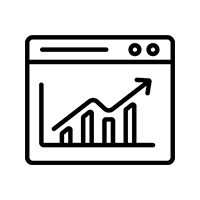
There are few reasons to have a website represent your business without analytics installed on it. This tool provides a business with vital information about the health of their site, the effectiveness of their messaging, details about where traffic to their website is coming from, and how well users are reacting to what they are seeing when they visit.
If you want to get the most out of your website, installing and understanding analytics data is essential.
At a minimum, a business should be paying attention to their analytics data monthly with detailed information about trends, past versus present performance comparisons as well as identifying if they actually have a qualified audience visiting their website. If there was ever a roadmap to proper change within a digital marketing campaign, this tool would be one of the highest on the list.
Hawker Digital campaigns all include Google Analytics installation if a business doesn’t already have it installed on their site. A strong portion of our monthly reporting comes from analytics data. We provide as much or as little as the client needs or wants. Without analytics, your digital marketing campaign is flying blind. Granted one can measure calls or forms submissions but it’s the missed opportunities you will never identify without measuring critical metrics.
Do you have analytics on your website, not currently running a digital marketing campaign yet still want to know what is going on with your traffic? Hawker Digital is happy to analyze report and consult on your current situation.

Importance Of On-Page SEO for Website Ranking
On-page SEO refers to the practices and techniques used to optimize individual web pages to improve search engine rankings. It involves optimizing various elements on your website, such as keyword research, meta tags, headings, URLs, and page content. By implementing effective on-page SEO strategies, you can enhance your website's visibility, increase its chances of ranking higher on search engine results pages, and ultimately attract more targeted traffic.
When it comes to website ranking, on-page SEO plays a crucial role. Search engines, like Google, consider various factors when determining the relevance and quality of a webpage. By optimizing your web pages for on-page SEO, you are providing search engines with the necessary signals to understand what your content is about and how it should be ranked.
Understanding Keyword Research for On-Page Optimization
One of the fundamental aspects of on-page SEO is keyword research. Keywords are the words or phrases users type into search engines to find information. You can identify the most relevant and valuable keywords to target on your web pages by conducting thorough keyword research.
When conducting keyword research, it's essential to consider the keywords' search volume, competition, and relevance. Tools like Google Keyword Planner and SEMrush can provide valuable insights into these factors. Once you have identified the target keywords, they should be strategically placed throughout your web page, including in the title tag, meta description, headings, and within the content itself. This helps search engines understand the topic and relevance of your page.
On-Page Optimization Techniques for Meta Tags
Meta tags are snippets of code that provide information about a web page to search engines and visitors. Two crucial meta tags for on-page SEO are the title tag and meta description.
The title tag is the HTML element that specifies the title of a webpage. It is displayed as the headline in search engine results and on the browser tab. Including the target keyword in the title tag is recommended, as it helps search engines understand the context of the page.
The meta description is a brief summary of the content on a web page. It is displayed below the title tag in search engine results. While meta descriptions do not directly impact search engine rankings, they can influence click-through rates. By crafting compelling and relevant meta descriptions that include the target keyword, you can increase the likelihood of users clicking on your website in the search results.
Optimizing URL Structure for Better SEO
Another important aspect of on-page SEO is optimizing the URL structure of your web pages. A clean and descriptive URL can help search engines and users understand what the page is about.
Ideally, your URLs should be concise, include relevant keywords, and use hyphens to separate words. Avoid using special characters, numbers, or long strings of random characters in your URLs, as they can confuse search engines and users.
For example, a well-optimized URL structure for a webpage about on-page SEO could be "https://www.example.com/on-page-seo." This URL clearly indicates the page's topic and is easier to read and understand.
Importance of High-Quality and Engaging Content
When it comes to on-page SEO, high-quality and engaging content is king. Search engines prioritize websites that provide valuable and relevant content to their users. By creating informative and well-written content that addresses the needs and interests of your target audience, you can increase the chances of your web pages ranking higher in search engine results.
When creating content, it's essential to focus on providing value to your readers. Use your target keywords naturally throughout the content, but avoid keyword stuffing, as it can negatively impact your website's rankings. Additionally, ensure your content is well-structured, easy to read, and includes relevant headings and subheadings.
Utilizing Header Tags for Improved SEO
Header tags, also known as H1, H2, H3, etc., are HTML tags used to define headings and subheadings on a web page. They help structure content and make it easier to read, and they also play a role in on-page SEO.
The H1 tag is the most important heading tag and should be used to indicate the page's main topic. It is recommended to include the target keyword in the H1 tag, as it helps search engines understand the relevance of the content.
Subsequent heading tags, such as H2, H3, etc., should be used to organize the content into sections and subsections. These tags provide additional context to search engines and users about the structure and hierarchy of your content.
Optimizing Image Alt Tags for Better Visibility
Images can significantly enhance the user experience on your website, but they also need to be optimized for search engines. One way to do this is by using alt tags for your images.
Alt tags, or alternative text, provide a textual description of an image. This is important because search engines cannot "see" images like humans. By providing descriptive alt tags that include relevant keywords, you can help search engines understand the content and context of your images.
Alt tags also benefit visually impaired users who rely on screen readers to browse the web. Including descriptive alt tags ensures that these users can understand the content of your images.
Implementing Internal Linking Strategies for On-Page SEO
Internal linking refers to linking to other pages within your website. It helps users navigate your website more easily and provides search engines with additional context and signals about the relevance and structure of your content.
When implementing internal links, it's important to use descriptive anchor text that includes relevant keywords. This helps search engines understand the topic of the linked page. Ensure your internal links are relevant and add value to the user's experience. Avoid excessive internal linking or linking to irrelevant pages, as search engines can see it as spammy.
Conclusion and Final Thoughts, On-page SEO Best Practices
In conclusion, on-page SEO is critical to any successful digital marketing strategy. By optimizing various elements on your web pages, such as keyword research, meta tags, URLs, content, header tags, images, and internal links, you can improve your website's visibility on search engines and attract more organic traffic.
Remember, on-page SEO is an ongoing process. Regularly analyze your website's performance, conduct keyword research, and make necessary optimizations to stay ahead of the competition. By staying up-to-date with the latest best practices and continuously refining your on-page SEO strategies, you can achieve better search engine rankings, drive more organic traffic, and, ultimately, grow your online presence.
![]()



